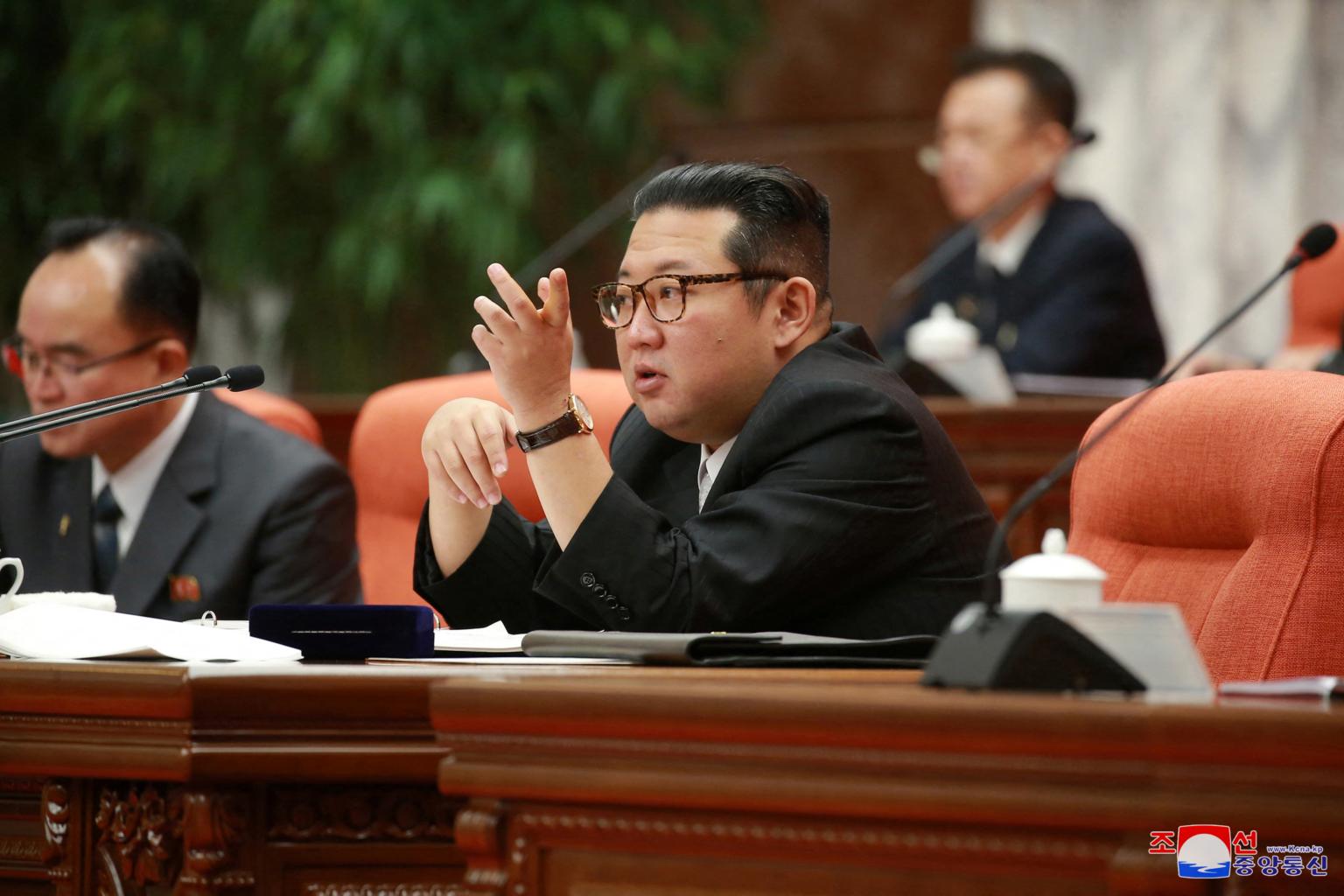Kim Jong Un prioritises food crisis over nuclear talks in 2022
Sign up now: Get insights on Asia's fast-moving developments

Mr Kim also put high priority on preventing the spread of the coronavirus.
PHOTO: REUTERS
Follow topic:
SEOUL (BLOOMBERG) - Mr Kim Jong Un urged North Korea to focus on easing food shortages and containing Covid-19, in a downbeat New Year's policy assessment that suggested nuclear talks with the United States were a low priority for the coming months.
The North Korean leader laid out his 2022 agenda in remarks to ruling party cadres that were published by state media on Saturday (Jan 1) and appeared to take the place of his traditional New Year's Day address.
During the five-day Workers' Party meeting in Pyongyang, Mr Kim also called for strengthening the military's power due to an unstable environment.
"The country’s economic projects are still under difficult conditions," Mr Kim said, according to the official Korean Central News Agency (KCNA), a rare admission of the strains his government was facing.
Much of the published remarks focused on agriculture, with the state facing one of its most dire food shortages since he took power a decade ago.
The situation has been made more worse by severe weather and his decision to shut borders due to the coronavirus pandemic, effectively slamming the brakes on legal trade and the black market flow of foodstuffs from China.
The meeting came as Mr Kim, 37, marks 10 years power and coincides with the New Year's Day holiday when the reclusive state's leader typically lays out economic and security priorities.
Mr Kim also put high priority on preventing the spread of the coronavirus. While North Korea has boasted that it has seen no cases of Covid-19, the US and others doubt the claim.
The comments included few references to foreign policy and relations with South Korea, according to Mr Cheong Seong-chang, director of the Center for North Korean Studies at the Sejong Institute think-tank near Seoul.
"This suggests that North Korea is not ready to engage in contact with South Korea and the US this year," Mr Cheong said.
Mr Kim sent a fresh warning to the US and South Korea, saying he would continue to advance his military capability "vigorously," amid an "unstable" situation on the Korean peninsula. The North Korean leader held back on the threats that he has made in previous messages.
Mr Kim has shown little public interest in returning to nuclear talks that were revived and then collapsed under former President Donald Trump. In recent months, the North Korean leader has rolled out his most latest weaponry designed to deliver nuclear strikes against US allies in Asia.
The North Korean leader has lost about 20kg, according to South Korea’s spy agency, perhaps in a sign of restraint as his country faces some of its worst difficulties since he took power.
The border closure has almost halted the work of aid agencies that for years have helped to bring food to a country where about 40 per cent of the population is undernourished, according to the United Nations World Food Programme.
The administration of US President Joe Biden has said the door is open for talks and indicated it would be willing to consider economic incentives to reward North Korea for taking steps to wind down its nuclear arsenal, which has only grown in size as disarmament discussions have sputtered.
At the same time, North Korea's economy is now smaller than when Mr Kim took power after his father Kim Jong Il died in December 2011, in large part as a result of the sanctions to punish him for testing nuclear weapons and missiles that can deliver warheads to the US mainland.
Mr Kim said in June at a similar meeting his country was open to "both dialogue and confrontation", offering the highest-level opening for discussions since Mr Biden replaced Mr Trump, who met Mr Kim three times.
But the North Korean subsequently started testing new weapons systems that included long-range cruise missiles capable of delivering nuclear warheads to all of South Korea and most of Japan as well as a new submarine-launched ballistic missile.
"Kim may not be able to afford to turn his attention away from the domestic situation. He at least needs to keep up appearances to show his people his awareness of the situation," said Ms Soo Kim, a Rand Corp policy analyst who previously worked at the Central Intelligence Agency in the US.
"There may not have been a direct message to the US, but the fact that the regime intends to continue building its military capabilities tells us Kim’s position on the nuclear issue is immutable," she said.

